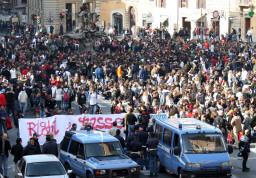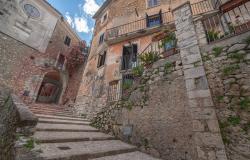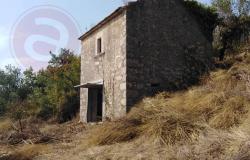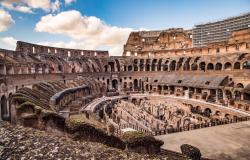Protests by university students against proposed government reforms in the education sector turned violent in Rome on Friday as a third week of sit-ins and rallies drew to a close.
Around a thousand students clashed with police when they tried to occupy one of the capital's railway stations, hurling glass bottles and other objects when they were prevented from occupying tracks.
One student suffered a head wound during the scuffle at Ostiense station, while others claimed they had been beaten by police batons.
But police denied any violence against students, saying they had only prevented access to the station and adding that ''several officers'' had been hurt in the hail of flying bottles.
Elsewhere in the city students caused traffic chaos by gathering around the main railway station and blocking bridges over the Tiber.
Marches and sit-ins continued to take place across the country, from Milan and Turin in the north to Cagliari and Palermo in the south.
In Naples thousands of students marched holding banners that read ''if they block our future, we'll block the city'', while in Pisa students staged sit-ins on several platforms at the railway station.
Unions have called a general strike for the education sector on November 14, which will be the second in just over two weeks.
Last week an estimated one million university and high-school students turned up in Rome for a national rally after parliament okayed controversial cost-cutting school reforms which include a return to a single-teacher system for elementary kids.
University reforms have yet to be finalised.
On Thursday Education Minister Mariastella Gelmini presented a series of guidelines for the reforms which include a reduction in teaching hours, a rationalisation of the number of degree courses offered, the introduction of courses taught in foreign languages, and a move to distribute 30% of public funding on a performance-related basis.
The guidelines also foresee moves to allow universities to become foundations in order to top up public funding with private investments.
Gelmini has pledged the protests will not alter government plans for a sector in serious need of reform.
According to the minister, Italian students attend three times as many lectures as the European average.
Despite this, the Italian system ''produces fewer graduates than Chile'', while ''there is not a single Italian university that features among the top 150 in the world'', Gelmini said.










